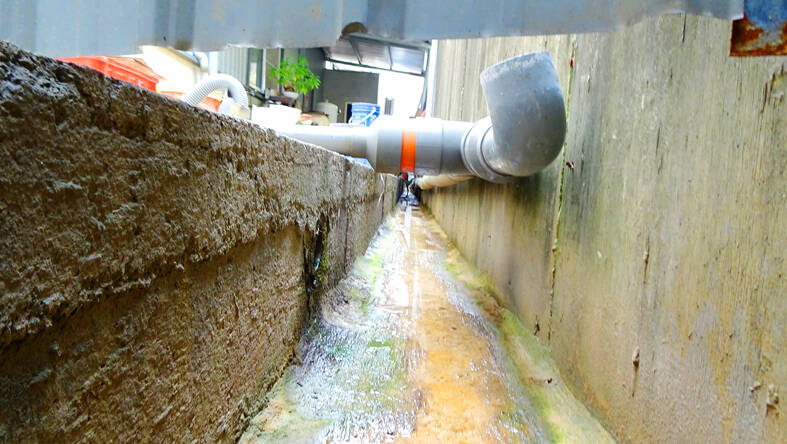The Ministry of Environment has revised regulations that would gradually increase water pollution control fees for common hazardous substances and extend their coverage to include zinc, tin and ammonia nitrogen.
Water pollution control fees have not been adjusted since the Regulations Governing the Collection of Enterprise and Sewage Systems Water Pollution Control Fees (事業及污水下水道系統水污染防治費收費辦法) were implemented 10 years ago, the Department of Water Quality Protection said in a news release.
However, operators might not be sufficiently motivated to minimize pollution if government-

Photo courtesy of the Ministry of Environment
imposed pollution control fees are lower than their pollution control costs, it said.
As such, the ministry decided to adjust the fees in accordance with the “polluter pays” principle that hold heavy polluters accountable, it said.
From next year, a phased increase of water pollution control fees is to be imposed on heavy metals, including lead, nickel, copper, mercury and its compounds, cadmium, chromium and its compounds, arsenic, zinc and tin, as well as cyanide and ammonia nitrogen, the department said.
Ammonia nitrogen was included in line with the Effluent Standards (放流水標準), as the substance is harmful to aquatic life and could lead to eutrophication, while zinc and tin were included as they are bioaccumulative, it added.
The fee adjustment is expected to affect 2,200 sewage system owners operating at industrial or science parks, power station owners and companies in the semiconductor, printed circuit board and electroplating industries, the department said.
To ease the impact of the fee adjustment on payers, operators would be granted a 50 percent discount next year, with the discount rate reduced annually until the full amount begins to be levied in 2031, it said.
For example, water pollution control fees levied on lead, nickel and copper would next year be raised to NT$1,000 per kilogram each from the current NT$625 and rise incrementally to NT$2,000 per kilogram six years later.
As the increase would be less than NT$20,000 for 90 percent of payers in the first year when the amendments take effect next year, the actual impact would be limited, the department said.
The amendments would also establish a wastewater treatment facility investment tax credit in line with the global initiative to reduce carbon emissions and achieve net zero, it said.
Companies investing in wastewater treatment facilities that help turn waste into resources can apply to the ministry or local environmental protection departments for reduced water pollution control fees, it said.
For example, pulp and paper manufacturing companies can apply anaerobic fermentation to wastewater for biogas power generation, while semiconductor companies can recycle high-concentration ammonia nitrogen from wastewater to productive resources, it said.
Deductible amounts would be capped at 60 percent of the payment for each period, with the deduction effective for a maximum of three years, the department said, adding that the goal is to facilitate industries’ green transition.

TRAFFIC SAFETY RULES: A positive result in a drug test would result in a two-year license suspension for the driver and vehicle, and a fine of up to NT$180,000 The Ministry of Transportation and Communications is to authorize police to conduct roadside saliva tests by the end of the year to deter people from driving while under the influence of narcotics, it said yesterday. The ministry last month unveiled a draft of amended regulations governing traffic safety rules and penalties, which included provisions empowering police to conduct mandatory saliva tests on drivers. While currently rules authorize police to use oral fluid testing kits for signs of drug use, they do not establish penalties for noncompliance or operating procedures for officers to follow, the ministry said. The proposed changes to the regulations require

Taipei, New Taipei City, Keelung and Taoyuan would issue a decision at 8pm on whether to cancel work and school tomorrow due to forecasted heavy rain, Keelung Mayor Hsieh Kuo-liang (謝國樑) said today. Hsieh told reporters that absent some pressing reason, the four northern cities would announce the decision jointly at 8pm. Keelung is expected to receive between 300mm and 490mm of rain in the period from 2pm today through 2pm tomorrow, Central Weather Administration data showed. Keelung City Government regulations stipulate that school and work can be canceled if rain totals in mountainous or low-elevation areas are forecast to exceed 350mm in

1.4nm WAFERS: While TSMC is gearing up to expand its overseas production, it would also continue to invest in Taiwan, company chairman and CEO C.C. Wei said Taiwan Semiconductor Manufacturing Co (TSMC) has applied for permission to construct a new plant in the Central Taiwan Science Park (中部科學園區), which it would use for the production of new high-speed wafers, the National Science and Technology Council said yesterday. The council, which supervises three major science parks in Taiwan, confirmed that the Central Taiwan Science Park Bureau had received an application on Friday from TSMC, the world’s largest contract chipmaker, to commence work on the new A14 fab. A14 technology, a 1.4 nanometer (nm) process, is designed to drive artificial intelligence transformation by enabling faster computing and greater power

China Airlines Ltd (CAL) yesterday morning joined SkyTeam’s Aviation Challenge for the fourth time, operating a demonstration flight for “net zero carbon emissions” from Taiwan Taoyuan International Airport to Bangkok. The flight used sustainable aviation fuel (SAF) at a ratio of up to 40 percent, the highest proportion CAL has achieved to date, the nation’s largest carrier said. Since April, SAF has become available to Taiwanese international carriers at Taipei International Airport (Songshan airport), Kaohsiung International Airport and Taoyuan airport. In previous challenges, CAL operated “net zero carbon emission flights” to Singapore and Japan. At a ceremony at Taoyuan airport, China Airlines chief sustainability